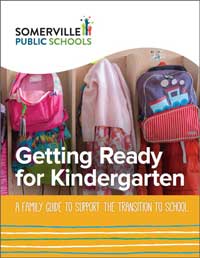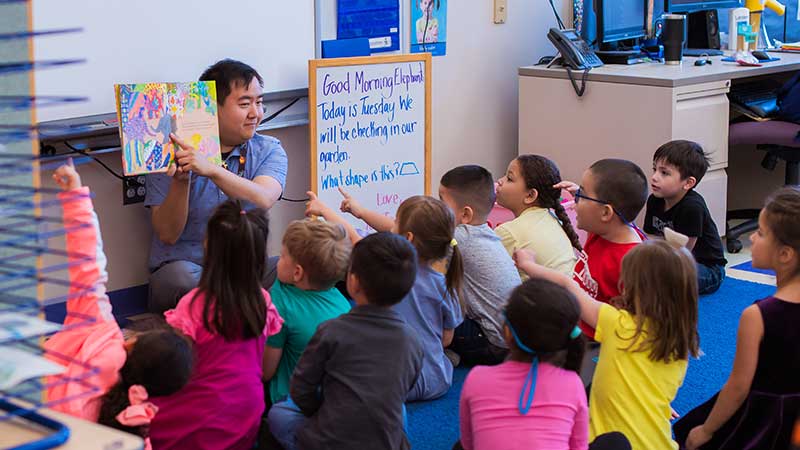Getting READY for school ALL YEAR LONG!
The transition to preschool and kindergarten is an exciting time that requires family support. It may be the first time away from home or a transition to a new setting and friends. Even the return to a familiar program can be filled with excitement and anxiety.
What does it mean to be ready for school? Readiness is something you can support every day with your children. Families can help children at home during daily family routines like grocery shopping, laundry, drawing, and reading and telling stories.
Here are a few simple ways you can support your child to be ready for their new adventure!
You are welcome to reach out to your school’s Family Liaison to ask school-specific questions during the school year. (Liaisons have limited hours in the summer.)
- Read aloud 15 minutes a day. Read to your child, have books available. Reading with your child in any language supports brain development and literacy.
- Build vocabulary. Talk about what you see around you. Ask your child what he/she is doing. How did you make that? What are you are building?
-
Practice self-help skills such as:
- Toileting (Toilet Training Tips)
- Handwashing
- Zipping and unbuttoning
- Getting dressed
- Make sure your child gets enough sleep. Lack of sleep is one of the primary reasons children have difficulty in school.
- Help your child to write his or her first name. Write it for them, have them trace over it with a finger or pencil. Trace the child's name with tracing paper. Post their name around the house so they can recognize it.
- Identify the letter names and sounds in your child's name and common words or signs in the community, like Stop or Exit.
- Count objects from 1-10, such as fruit, napkins, or toys.
- Take your child to their new school's playground.
- Set up playdates. Help your child share toys, cooperate, and listen to others.
- Set regular times for meals. Limit sugary snacks and offer fruits and vegetables.
- Visit the doctor and dentist regularly and get your child's vision and hearing checked.
GETTING READY in the Winter
Parents and guardians are encouraged to attend a tour during the School Tours Events. Tours are an opportunity to learn more about individual schools and may inform your family's decision about which school is right for your child.
GETTING READY in the SPRING
Explore our multilingual guide “Getting Ready For Kindergarten – A Family Guide to Support the Transition to School”
Getting Ready for Kindergarten | Preparándonos para kindergarten! | Preparando-se para o Jardim de Infância! | Preparasyon ou Jadendanfan!
In this guide, you will find:
- Key information about Somerville Public Schools kindergarten classrooms
- The people who support your child’s educational journey
- Ideas to help your child get ready for kindergarten
- Ways to be active in supporting your child’s success
- Somerville Public Schools contact information

Watch a recording of the 2025 Getting Ready for Kindergarten Workshop.
GETTING READY in the SUMMER
Read a story with your child about their new specific school to help them get excited about their first day!
- Argenziano: English, Spanish, Portuguese, Haitian Creole
- Brown: English, Spanish, Portuguese, Haitian Creole
- Capuano: English, Spanish, Portuguese, Haitian Creole
- East: English, Spanish, Portuguese, Haitian Creole
- Healey: English, Spanish, Portuguese, Haitian Creole
- Kennedy: English, Spanish, Portuguese, Haitian Creole
- West: English, Spanish, Portuguese, Haitian Creole
- Winter Hill: English, Spanish, Portuguese, Haitian Creole
Attend the Get Ready for School Fair
Attend the Get Ready For School Fair in the summer. Start the new school year with fun and learning! Come talk with SPS staff, learn more about your school, discover activities and programs, and meet other families in Somerville. There will be book swaps, free backpacks, kid-friendly activities and more!
Getting Ready FOR THE FIRST DAY OF SCHOOL
There are simple things you can do at home to prepare children for the first day of school.
- Practice and know the route to school, know how long it takes to get to school, and identify the school entrance.
- Come play in the playground - a great way to get exercise and feel comfortable at school.
- Gather supplies: Do you have a backpack, snack bag/lunchbox?
- Get enough sleep. Establish a bedtime routine and wake up time and routine.
- Check your child's school website for arrival and dismissal times, routines, and school calendar.
- Read books about going to school and what happens in school.

